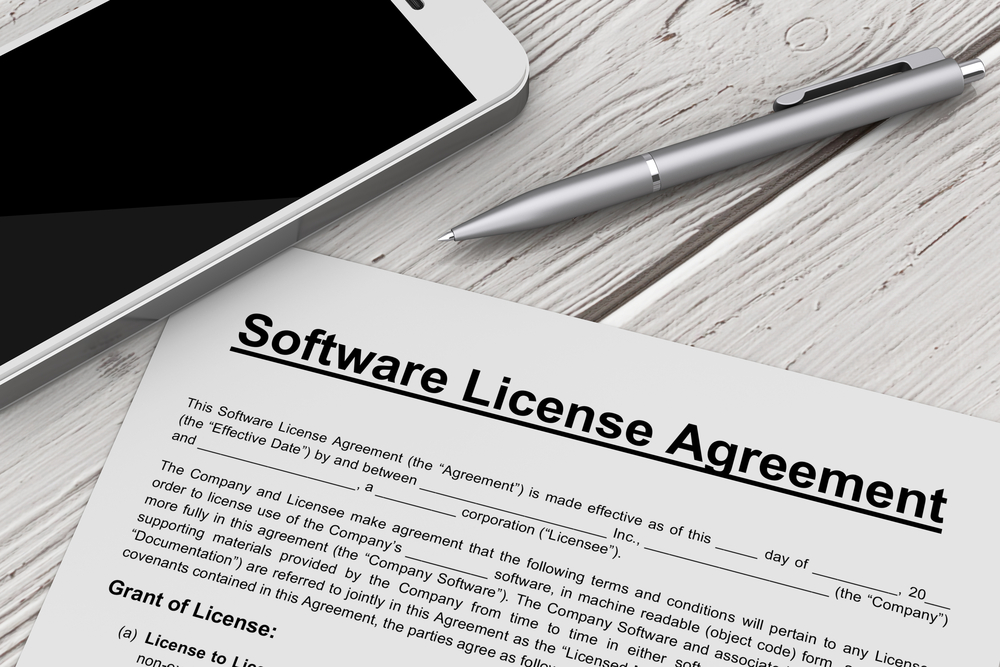A software reseller agreement is a legal agreement outlining the rights and responsibilities between the owner of software (the “publisher”) and a person or business wanting the right to sell or license the software to third parties (the “reseller”). A software reseller agreement is sometimes referred to as a “software distributor agreement” or a “software distribution agreement”.
The software reseller agreement contains important terms and conditions relating to the rights and responsibilities of the reseller. Although each software reseller agreement will vary depending on a variety of criteria, here are some key terms that will need to be addressed:
Agent vs. Sales Representative vs. Reseller
Although software reseller and sales representative are often used interchangeably, from a legal perspective, they are very different. However, the lines between these distinct roles are often blurred.
An agent is a legal representative of the principal (which, in this case, would be the software publisher), which includes employees of the publisher. Thus, the agent is legally authorized to enter into contracts on behalf of the software publisher – which would include software licenses to end users. Although sales employees are often paid a commission as part of their compensation, they often receive a base salary, employee benefits, and their expenses are paid by the employer.
A benefit of using an employee to sell software is that the employee should be focused on selling the employer’s products – not competitors. In addition, the employee will devote all of their time to selling on behalf of the employer. Of course, the employer must bear the cost of the employee’s salary, benefits and expenses. In addition, the employer could be liable for any injury or damage caused by an employee. Finally, if the employee is based on a state or country outside of the employer’s base of operation, by having an employee in the foreign jurisdiction, the employer could be responsible for compliance with the employment, tax, and other laws of that foreign jurisdiction.
By contrast, an independent sales representative is not legally empowered to execute end user licenses on behalf of the software publisher. Instead, the representative will negotiate terms with the prospective licensees, but the software publisher will enter into a software license agreement directly with the end user. The representative is compensated with a sales commission, which is typically a percentage of the license fee associated with the software license.
A key benefit to using an independent sales representative is that the publisher is not responsible to pay a salary or incur any other costs of the independent sales representative except a commission – and that is only paid if and when the independent sales representative makes a sale.
Of course, an independent sales representative might also represent other products – including those which compete with the publisher’s software products. As such, the publisher cannot count on the loyalty and focus of the independent sales representative to be the same as one of the publisher’s employees.
In some instances, the publisher may cover some of the independent sales representative’s costs, provide equipment or office space, and event pay a monthly retainer. These factors might cause the independent sales representative to be treated as if it were an employee under local law, which could cause lots of headaches for the publisher. Of course, if the independent sales representative were a corporation, LLC or other entity instead of an individual, the publisher would not have to worry about that since only individuals can be considered employees.
Like an independent sales representative, a software reseller is independent of the publisher and does not have the ability to enter into contracts on behalf of the software publisher. In a traditional reseller arrangement, the reseller will pay a fee to the software publisher for the right to resell or sublicense the software. The difference between this fee and the fee the reseller charges the end user will be the software reseller’s compensation. However, because software resellers often are compensated via a commission-style arrangement, this can be a source of confusion as to the true role of the reseller.
As such, the agreement between the software reseller should clearly establish the reseller’s role and distinguish it from that of either an employee or independent sales representative.
In addition, if third parties mistakenly believe the reseller to be an agent or employee of the publisher, actions and agreements signed by the reseller could be considered binding on the publisher, itself. To avoid this, the publisher should ensure that the reseller does not represent itself as an employee of the publisher. This often happens when the reseller uses a title like “VP Sales for Latin America” on business cars and email signatures, typically along with the publisher’s name and logo. The publisher should require the reseller to clarify its relationship with the publisher when dealing with third parties, using a title such as “Independent Reseller.”
Exclusive or Non-Exclusive Software Reseller
Most commercial software reseller agreements are non-exclusive, meaning that the publisher may grant others the right to resell the software. In some situations, a software reseller agreement may be exclusive, which would prohibit the publisher (or any of its other resellers) from reselling or distributing the software to certain end users.
The terms of exclusivity are often limited by geography (“the United States”) or by industry or “field of use” (e.g., education, healthcare, etc.) Thus, the publisher would be permitted to grant licenses to people outside the scope of the exclusivity.
Whenever any form of exclusivity is granted, the publisher should insist on including performance requirements in the software reseller agreement. This could provide that exclusivity is contingent on the reseller selling a certain number of licenses or producing a certain level of revenue each year. For new markets, the performance requirements are often stair-stepped and increase each year over the term of the agreement.
Software Reseller Agreement Payment Terms & Renewals
Compensation to the reseller is typically the difference in price between the amount paid by the user/customer and the price paid by the reseller to the publisher. However, some software reseller arrangements provide for the reseller to receive a sales commission based on license fees paid to directly to the publisher by the user, which is more similar to how a sales representative of agent is compensated). This is especially true of “software as a service” agreements (or “SaaS agreement”).
Also, if the user license is based on an annual or other renewable subscription, or if the user can purchase additional products or services from the publisher, the software reseller agreement should clarify whether the reseller is entitled to compensation in connection with any such renewals or additional purchases.
Where the software reseller is truly a reseller, the reseller purchases licenses from the publisher and then sells the licenses to its customers. In these instances, the reseller wants the publisher to commit to certain pricing of its products so that the reseller will be able to up-charge enough to make a reasonable profit.
Payment is typically made at the time of purchase but could be aggregated on a monthly or quarterly basis. The reseller should also be able to reduce its payment to the publisher in the event the reseller has to refund or write off a sale, though the publisher will not want to bear the burden of collection from the reseller’s customers.
Software Updates and Maintenance
The software reseller agreement should address whether the publisher is obligated to provide end users maintenance or upgrades to the software and, whether an additional fee is required for any such maintenance or upgrades. Of course, the reseller will likely want to pass any additional fees on to its customers.
Installation, Training, and Software-Related Services
The software reseller agreement should address whether the reseller is obligated or allowed to provide installation, training or other services. In fact, many software resellers are primarily IT services companies who offer the publisher’s software as an add-on or tool to their clients or a middleware using the software to bridge their own software applications with the customer’s software or date, or that of third parties. In these arrangements, it is important that the software reseller agreement address the potential issues associated with the interplay of these various systems.
Software Reseller Agreement Term and Termination
The term of a software reseller agreement describes the period of time in which the reseller is granted the right to resell the software. Often this, is for an initial term, and may be extended for additional terms (typically this is subject to the reseller having met certain performance obligations during the initial term).
Regardless of the length of the term, the software reseller agreement should address what happens when the term expires or is otherwise terminated. Some post-termination items that may need to be addressed include the impact on end user license renewals, ownership of data or other IP associated with modifications to the by the reseller, software whether future commissions are owed to reseller, and responsibility for ongoing service agreements related to the software.
International Software Reseller Agreements
If the reseller is granted a territory outside the United States, the publisher must consider what impact the laws of the foreign jurisdiction might have on the software reseller agreement. Some countries require resellers to register. Otherwise grant the reseller a form of property rights to the market the reseller creates in the territory. In other countries, their laws render exclusivity provisions unenforceable.
Also, the publisher should include language in the international software reseller agreement to prohibit the reseller from registering the publisher’s trademarks in the foreign jurisdiction and requiring the reseller to cooperate with helping the publisher police and enforce its intellectual property rights in the foreign jurisdiction.
Finally, an international software reseller agreement should include language requiring the reseller to comply with US laws regulating international trade such as export controls, sanctions, not dealing with restricted parties, and avoiding bribery of foreign officials. Even though the reseller is independent of the publisher, violation of these laws by the reseller can cause significant trouble for the publisher.


